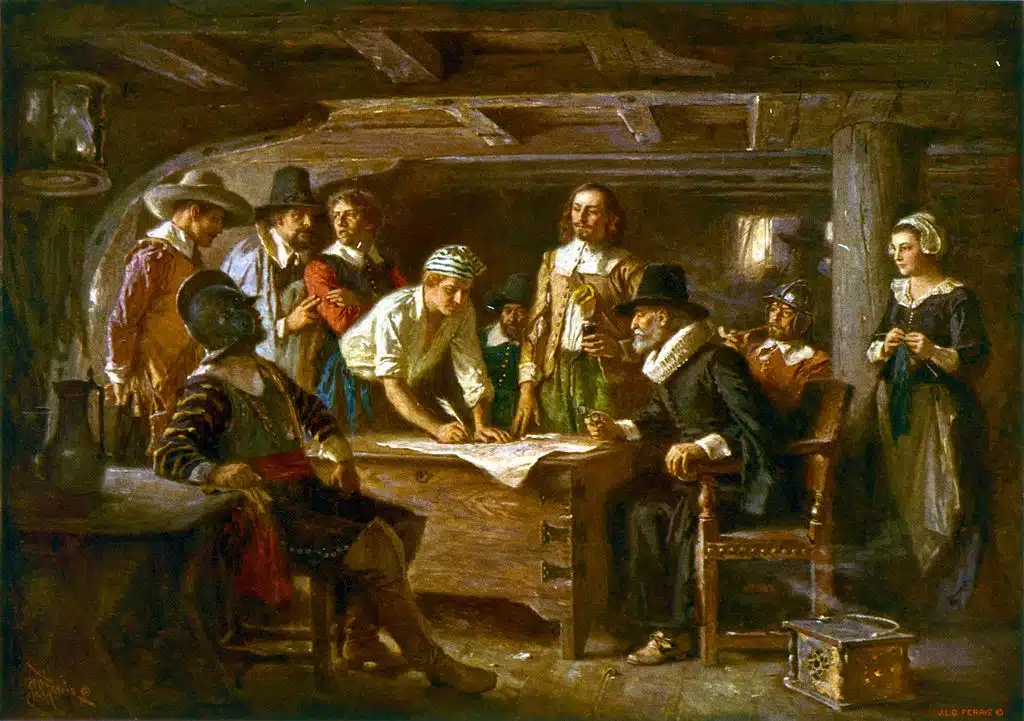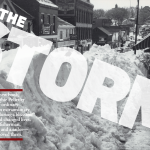What Makes a “New England First Family”?
Some of New England’s best traditional humor originates from Boston’s old-fashioned reputation for having a snobby attitude. Jud Hale uncovers the truth about the Cabots and the Lowells and that sort of thing.

The Mayflower Compact, 1620 by Jean Leon Gerome Ferris
Photo Credit: <a href="https://commons.wikimedia.org/wiki/File%3AThe_Mayflower_Compact_1620_cph.3g07155.jpg">Public Domain/Wikimedia Commons</a>A “New England First Family” is not a term much used or even known about these days. But I’m occasionally asked about it. Who is qualified to be a “First Family”, people ask – and do they still exist? As to the former, I’ve always thought of First Families as those whose Puritan ancestors founded the Massachusetts Bay Colony during the 1630’s and went on to accumulate considerable wealth and influence. And, sure, some are still around today. Some would be thought of as the quintessential “Boston Brahmin.” But, of course, few live in Boston anymore. Most are out on the North Shore. (For those of you who live elsewhere, the North Shore refers to the coastal towns north of Boston.)
I recently ran across an article in an old Yankee describing what was once considered the “proper ancestry” for a First Family. It was written by none other that Oliver Wendell Holmes. To qualify, he wrote, one needed “Four or more generations of gentlemen and gentlewomen; among them a member of his Majesty’s Council for the Provinces, a Governor or so, one or two Doctors of Divinity, or a member of Congress not later than the time of long boots with tassels.”
Under those general guidelines, I’d say First Families include, for instance, the Cabots who, as the saying goes, speak only to God; the Lowells, who speak only to the Cabots; The Adamses, acknowledged to be the foremost of all First Families; the Forbeses, perhaps the wealthiest; the Appletons, who made a fortune, as many First families did, in the textile industry; the Saltonstalls, who have sent sons to Harvard in every generation since Nathaniel Saltonstall graduated in 1659; the Peabodys, whose family fortune was founded by Joseph Peabody of Salem, a privateer during the Revolution; the Winthrops, who helped found the Massachusetts Historical Society (right up there with the Athenaeum in social status); the Putnams who, along with the Jacksons, Bowditches and Warrens, headed the Harvard Medical School throughout the nineteenth century; the Quincys, who include a President of Harvard; the Phillipses, who founded both Andover and Exeter; the Lodges, who have been senators and oodles of other good positions, including Harvard overseer; the Emersons, whose scion Ralph Waldo did quite well in the writing field; the Eliots, who include presidents of both Trinity and Harvard…and the list goes on.
Well, it doesn’t go on forever. While you’re not beginning to “slum” after naming the first fifty or sixty, you are beginning to water the soup. The number of First Family members didn’t increase as much as one might expect because they all hung around with each other and intermarried. Thus you had a Cabot Lodge, a Godfrey Cabot Lodge, a Cabot Lowell, a Peabody Gardner, an A. Lawrence Lowell and so forth. As historian John Morse, Jr. says in his Memoir of Colonel Henry Lee: “Lees, Cabots, Jacksons and Higginsons knew each other well…and had a satisfying belief that New England morality and intellectuality had produced nothing better than they were, so they contentedly made a little clique of themselves and intermarried very much, with a sure and cheerful faith that in such alliances there can be no blunder.”
Today, though most would deny it, First Family-status still can provide an inside track insofar as obtaining certain executive positions in Boston. At least, on the initial contacts. Outside of New England is a different situation, of course – as exemplified by the story of the young Bostonian who requested a family friend at the Old Colony Trust Company (which no longer exists) to write a letter of recommendation to a Chicago firm to which he was applying for a position.
“I can recommend him to you without the slightest reservation,” wrote the family friend, saying that the young man’s mother was a Cabot, his father was a Lowell and his ancestors were all Peabodys, Appletons, Forbeses, and Saltonstalls.
The Chicago firm politely replied that they were really looking for different information. “After all,” they wrote, “we are not contemplating using this young man for breeding purposes.”
I wonder if that story is true. Come to think of it, I’d have to say “probably”.
This post was first published in 2012 and has been updated.








Interested in New England History and the Lowell family
So glad to find a Judson Hale article pop up today……the “voice”is distinctive and welcome.
This story tickles me, especially as I remember my grandparents telling us when we were very young, that WE were related to the Cabot Lodges as well. I recalled that a man Henry, of that name had recently been in the news for some political accomplishment, and that was a thing to be proud of. – Years passed, and as our interest turned to ancestry, etc., we learned that our Daddy’s Mom, our sweet Nana, at age 16, had made the crossing from Ireland to Boston, sponsored by a family that she later was in the employ of, as a ‘domestic’ – aka, housekeeper. This, in fact was the Cabot Lodge Family. She always felt like ‘family’ with them, apparently, but I guess I was too young to notice the twinkle in the eyes as that story was passed on to us.
Me too!!
I love reading these articles. I posted on FB that we do have some Bowditches and Warrens in our history but mainly we’re a gang of Delanos.
Whereas I recognize that those who stayed in Boston and thereabouts are thought of as the First Families. It’s unfortunate and a bit self-congratulating that they don’t recognize those who came at the same time, founded towns and industries, etc. throughout New England and are just as much First Families. Every one of my progenitor ancestors, on both sides, arrived in NE between 1634-1670. My mother’s line went on to New Hampshire and Connecticut and my father’s stayed in Massachusetts — Western Massachusetts that is. They were all successful, founded towns and cities, banks and businesses; fought (and died) in the Indian Wars, the Revolution. I had lines around Boston such as Amesbury and Haverhill, etc. as well. So while the Boston First Families deservedly take credit for all that they did, never forget — and honor — the vital role that so many other New England early founders played as well!